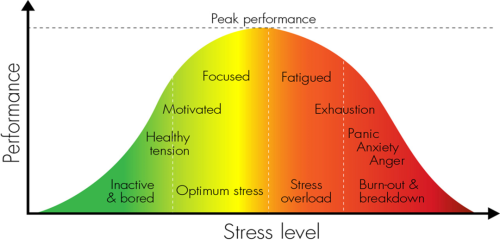How To Deal With Exam Stress
Created from materials made by the HFEH Mind Mental Health Support Team
Taking exams is an important part of school but this can be a stressful time. Feeling stressed about exams is not only normal, it’s actually healthy.
Stress is not fun for anyone to experience but it is a crucial part of how our minds and bodies operate. Without reasonable stress we would not be able to focus, work as hard, or achieve as much.
We have all experienced stress, but we might not know exactly what it is. The definition of stress is the feeling of being overwhelmed or unable to cope with mental or emotional pressure.
However, a reasonable amount of stress or pressure can help us.
What is stress and why do we get it?
Definition of Stress
Stress – The feeling of being overwhelmed or unable to cope with mental or emotional pressure.
How Stress can help us

When working on something important we want our stress levels elevated, not overloaded. The right amount of stress helps motivate us and keeps us focused. Once we have finished our work for the day we can relax and let go of that stress.
Too much stress can leave us angry, exhausted, or even anxious if we feel we have been working really hard but still have not done enough. This can lead to a negative cycle where we put increased pressure on ourselves, push ourselves too hard, and become more stressed.
Understanding Stress
Stress is a biological response to danger we have built up over millions of years. It helped keep us alive, and still helps us today. It is instinctual, meaning it’s not something we consciously control.
One way to think about is as the body’s alarm system. It gets triggered and immediately starts making changes to how the body works to give us the best chance of survival. Stress can also be known as the fight or flight response.
What is the fight or flight response?
The fight or flight response is the instinct our bodies have when in danger to either fight the threat, or run away. It was developed over millions of years from when we were cave people, it is our body trying to generate enough energy to help us survive.
It’s why when we’re stressed our hearts beat faster, pumping blood to where it’s needed most in our body.
The problem is our minds have evolved much faster than our bodies. Stress used to help us fight or run away from sabre-tooth tigers, now it just makes us feel sick before an exam, which isn’t exactly helpful, but there are ways we can manage it.
How to manage stress
Deep Breathing
One of the easiest ways to control and manage stress is through deep breathing. It sounds almost too simple to be true, but since stress is a physical response, it makes sense that a physical solution can help manage it.
Part of the body’s stress response is rapid breathing, as the body thinks it needs more oxygen to either fight or run.
Slowing breathing down, by breathing through the nose and out through the mouth, helps the body calm down. Next time you are feeling stressed, try breathing in for three seconds, then breathing out for five seconds, for three rounds. You want to breathe out longer than breathing in, so your body starts to relax as you get rid of excess oxygen.
The great thing about this technique is that it starts helping right away. You can do it for a moment before opening an exam paper, or for a minute or two once the exam is over. Find what works best for you.
Here’s a video on Deep Breathing.
Muscle Relaxation
Another way to manage the physical side of stress is through progressive muscle relaxation.
Often when we’re stressed, we feel tense in our neck, shoulders, and other areas. We can help reduce this physical symptom of stress by tensing different parts of our body and then relaxing them.
You can start by tensing your arms or your shoulders for five seconds, then let them relax. Move through your body, tensing each set of muscles for five seconds and then relaxing them.
This helps because when your body is physically relaxed, your mind relaxes as well, which can help you feel less anxious.
Stay connected with others
One of the easiest ways for us to manage stress is to spend time with people who are supportive and can make us feel happy.
Just having a laugh with a friend or a conversation with a family member can really help cheer us up. In terms of our psychology this helps build our sense of belonging, which is very important to our overall wellbeing.
If we spend too much time by ourselves, especially when we’re stressed, we can end up with untrue, unhelpful thoughts: that we’re not good enough, or that we’re going to fail.
If we let them, these unhelpful thoughts can influence our feelings and our actions, meaning we could sabotage our chances to do well.
However, these unhelpful thoughts are not true and there are ways to fight back against them.
How to manage unhelpful thoughts
Catch them
If we allow a constant stream of negative thoughts to run through our minds, they become can harder to get rid of. However, there are simple steps we can take to stop them.
The first thing you need to do is to realise you’re having a negative thought. Catching them before they can impact your mood can help start to change the unhelpful thinking pattern.
Check them
From there, check these thoughts to see if there’s actually any truth in them. Are things really as bad as they seem?
Challenge them
If you’re revising and you catch yourself thinking ‘this is pointless’, or ‘I’ll never pass’, take a second to challenge those thoughts. Why are you thinking that? Is it true?
From there, you can begin to change them. When you catch yourself having a negative thought, you can begin to ask yourself: ‘is this helpful?’ If it isn’t, don’t let yourself think it. It might sound too simple, but it really can work.
Over time, you should hopefully notice less and less negative thoughts, as you’ve changed the way you think.
Hopefully these tips can help you deal with stress, and revise without the anxiety exams can bring.
Read more of our tips for young people’s mental health.
If you need support with your mental health, please get in touch with us.
Sign up for our Newsletter
Sign up here for our monthly newsletter of mental health tips and advice, as well as to know what we’re up to.
We have newsletters for adults, children and young people, parents, and education staff.
Posted on: 3rd March 2022

















